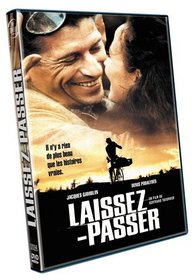| Genres: Indie & Art House, Drama Sub-Genres: Indie & Art House, Drama Studio: Tva Films Format: DVD - Subtitled DVD Release Date: 10/25/2007 Release Year: 2007 Number of Discs: 1 SwapaDVD Credits: 1 Total Copies: 0 Members Wishing: 0 Edition: Import MPAA Rating: Unrated Languages: French Subtitles: English |
Search - Laissez: Passer (2002) (Sub) on DVD
  | Laissez Passer 2002 Genres: Indie & Art House, Drama UR 2007 |
Larger Image |
Movie Details
We're sorry, our database doesn't have DVD description information for this item. Click here to check Amazon's database -- you can return to this page by closing the new browser tab/window if you want to obtain the DVD from SwapaDVD.
Click here to submit a DVD description for approval.
Similar Movies
|
Movie ReviewsActs of Resistence Trevor Willsmer | London, England | 07/31/2008 (4 out of 5 stars) "Laissez-Passer aka Safe Conduct is at times almost like Day For Night Goes to War - richly ironic considering Francois Truffaut famously attacked the `Tradition of Quality' in French cinema that screenwriters Jean Aurenche and Pierre Bost represented since both are characters in Bertrand Tavernier's lengthy but entertaining wartime comic drama that defends that very tradition of cinematic craftsmanship and professionalism. Indeed, the film is based on anecdotes that Aurenche (Denis Podalydès), who wrote several of Tavernier's early successes such as The Watchmaker of Saint-Paul and Coup de Torchon/Clean Slate, and director Jean-Devaivre (Jacques Gamblin) told about their wartime experiences at German-owned producers Continental Films during the Occupation.
The best-funded but most despised film company in France during the war, many of its employees would later find their careers handicapped by association (particularly Henri-Georges Clouzot, whose critique of informers Le Corbeau was widely criticised as a slur on French dignity), yet among its numbers could be found resistance workers and even Jews protected by the German management who prided themselves on making the best films. While Continental was few French filmmakers first choice, Tavernier shows how many would slyly insert subversive messages into the films while juggling with increasingly absurd practical limitations - not only did they have to limit the length of shots because they could only get short ends of film to use or deal with constant power cuts but often didn't even have enough wood to build the sets because the studio sold their allocation for coffins for the Eastern Front. The company even rented out office space to the Gestapo to earn a few extra Francs. Rather than opt for a relentlessly grim view of the Occupation, Tavernier instead focuses on the absurdity of the situation. Much of the strength of the film comes from the way it shows how people adapted their everyday life to an increasingly askew way of life, where bad actors get bit parts in exchange for black market food, extras eat fake stage food because they are so hungry and you can come home one day to find an anti-aircraft gun has suddenly appeared on your apartment roof and keeps on waking the baby. Even the great and the good of French cinema fall in and out of favour in these times just as easily as the obscure: the screenwriter of La Grande Illusion, let out of jail during the day to rewrite a script on the set, writes food into every scene because he's been starved in solitary confinement for two months, while Jean-Devaivre's interrogation by British officers during a surreal and unplanned trip to England suddenly warms up when the subject of Maigret and Harry Baur (himself tortured to death by the Gestapo) comes up in the conversation. Yet it's not unaware that events often took a darker turn, as an early air-raid threatening a children's ward, a collaborator interrupting a dinner party to beat up a tramp in the street below and one striking moment singling out an extra in a forgotten movie on television powerfully bring home. Fans of classic French cinema will have a field day with the many references - particularly Douce, Le Corbeau, Au Bonheur des Dames and La Main du Diable as well as figures like Maurice Tourneur, Claude-Autant-Lara, Michel Simon and Charles Spaak - but they're not essential to enjoying the film. As always with Tavernier, people come first. Tavernier is a director who genuinely seems to like his characters, even (and sometimes especially) the flawed ones, and his habit of providing reasons for doing what they do made this film in particular an easy target for some who saw it as excusing wartime collaboration. Yet the film shows the issue as at once both more mundane and complex than a simple issue of them and us, with even the communist resistance who urge members to infiltrate Continental later turning on them as policy changes. But in their very different ways the two main characters DO resist, and each in a manner appropriate to their character. The writer Aurenche resists through the language of his scripts, while the assistant director Devaivre resists with practical actions, in a way representing how it was possible to covertly resist with thoughts as well as deeds. It's slightly problematic at times that the two main characters never really meet, with Aurenche increasingly sidelined as the film concentrates on Jean-Devaivre's attempts to juggle his resistance activities with his work as an assistant director, but it's a problem you notice more after the film than during it. Chances are you'll be enjoying yourself too much watching it. " |

